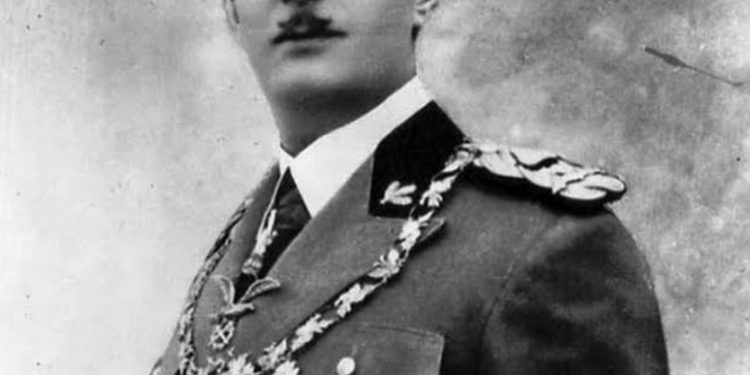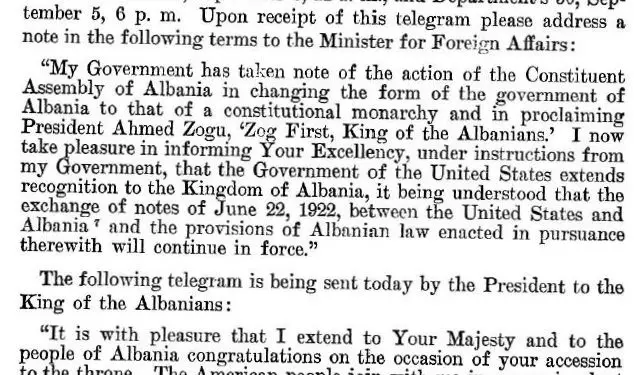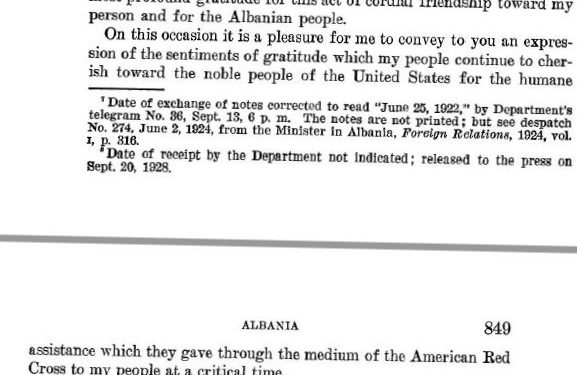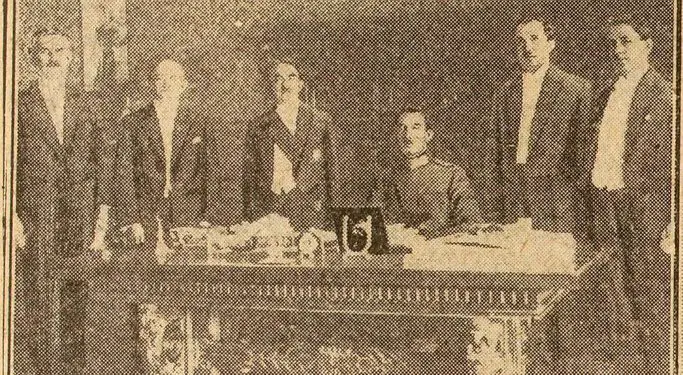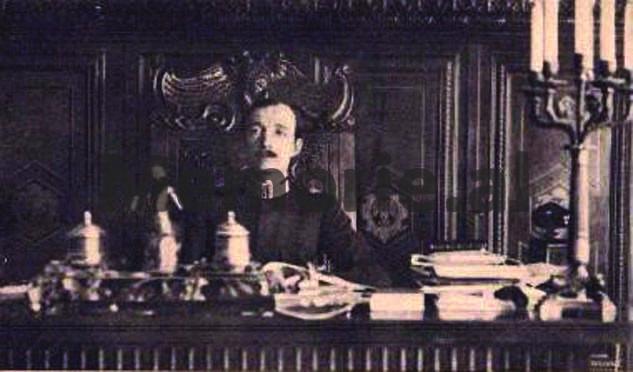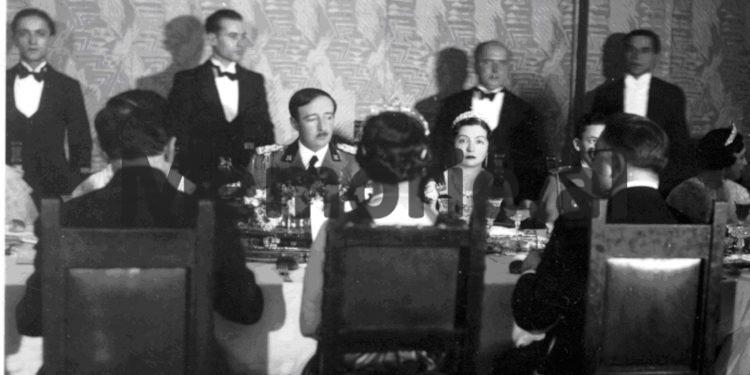
* By Ekrem SPAHIU
On the occasion of the 92nd anniversary, September 1, 1928 – 2020
On the 92nd anniversary of the Kingdom of Albania and in the context of today’s Albanian developments, the question can legitimately be asked: why was the Kingdom of Albania immediately recognized by the natural allies of Albania?
In these 108 years of the Albanian state, the governing spectrum of Albania at certain moments has been unstable, and even completely absent. Albania proved a one-year rule of its founder Ismail Qemali that the internationals followed with a six-month government of a non-Albanian prince selected by them. In the First World War, Albania was found completely without a national government. Fan Noli’s government for several months was hardly recognized internationally. In World War II, Albania was again without a national government. The government of the 45-year communist dictatorship was recognized only by communist countries and, formally, even by a few Western countries, but never by the US and the UK.
Despite this, the several-year government of Ahmet Zogu as Prime Minister and President and the 11-year-old Kingdom of Albania were recognized by all Western countries, first of all by the USA and the United Kingdom.
Recognition of states is one of the most important elements that determines the very existence of the state as a recognized subject of international law. In this context, the international recognition of the government complements the recognition of the state and brings it to life. International recognition of the state is conditioned by the recognition of the right of a people to have a state. International recognition of a government is conditioned by the degree of its legitimacy to represent the state.
The state can function even without recognition, but such a state either has a short life or turns into a dictatorship. Albania’s experience fully confirms this conclusion.
All Balkan countries between the two wars were monarchies, except Albania. As such they better represented and more effectively pursued the national interests of their countries. Kings represented the entire nation as opposed to politicians representing only their own political force. Kings offer long-term representation, not short-term interests as politicians represent. Kingdoms, by staying above politics, ensure political stability by giving a central figure the right to intervene so as not to let the country fall into political chaos. Politicians make promises to the country which they compromise the next day, while the kingdom is not interested in devaluing itself.
Albania of 1928 had come to such a necessity. After 1914, until the Congress of Lushnja, Albania was almost without a government and the nation without a mother state. This would bring serious national consequences for the Albanian state and nation to the risk of questioning their existence. It would be largely to the credit of US President Wilson’s political philosophy that Albania survived unscathed until disintegration.
A disintegrated Albania would be a fatal blow to the Albanian nation. A disintegrated Albania would also change all geopolitical balances in the Balkans. Under these conditions, Albania and the Albanians were saved only by a strong centralized hand. From a centralized Albania, the Balkans and even Europe were relieved of a conflict whose end was unknown.
In function of these geopolitical and national imperatives, as well as in respect of the values and criteria for international recognition, the Kingdom of Albania was recognized by a relatively large number of countries for the time. But much more important than the number, is the fact that the Kingdom of Albania was recognized by all countries with a long democratic history which have legitimacy as a basic criterion. Meanwhile, Europe was very interested in a stable Balkans and, in the meantime, in a stable Albania. In this context, it would be dangerous for a country with natural European history and affiliation such as Albania to be invaded by Bolshevism.
In these national and international conditions, the Kingdom was the best possible alternative to solve not only the Albanian national stalemate, but also the international problem that could be caused by the disintegration of Albania. It was precisely these necessities of the time that formed the basis of the international recognition of the Kingdom. She was immediately recognized by her natural allies. Italy was the first to recognize the Kingdom of Albania. Within September when it was announced, it was officially recognized by the United Kingdom, the United States, Austria and Germany. Certainly it was a diplomatic success that was recognized by Greece, France, Yugoslavia, Bulgaria, Romania, Spain and even Uruguay, Japan, Lithuania, etc.
An expert and active participant in the political developments in Albania at that time, Eqrem bej Vlora, estimated that: “In this selfish world, no one gives you anything badihava. Ahmet Zogu has deserved his success with the difficulties, hardships and dangers he had to face “.
From the letter exchanges for the recognitions of the Kingdom of Albania, we are reflecting only that with the United States of America, where King Zog addresses the President of the USA – Calvin Coolidge and the US Secretary of State Frank B. Kellogg.
875.91 / 280: Telegram
The Secretary of State to the Minister in Albania (Hart)
WASHINGTON, September 12, 1928 – 5 p.m.
35. Your No. 58, September 6, 11 a.m., and Department’s 30, September 5, 6 p.m. Upon receipt of this telegram please address a note in the following terms to the Minister for Foreign Affairs:
“My Government has taken note of the action of the Constituent Assembly of Albania in changing the form of the government of Albania to that of a constitutional monarchy and in proclaiming President Ahmed Zogu‘ Zog First, King of the Albanians. ‘ I now take pleasure in informing Your Excellency, under instructions from my Government, that the Government of the United States extends recognition to the Kingdom of Albania, it being understood that the exchange of notes of June 22, 1922, between the United States and Albania 7 and the provisions of Albanian law enacted in pursuance therewith will continue in force. ”
The following telegram is being sent today by the President to the King of the Albanians:
“It is with pleasure that I extend to Your Majesty and to the people of Albania congratulations on the occasion of your accession to the throne. The American people join with me in expressing best wishes for Your Majesty’s good health and happiness and for the prosperity of Albania. ”
The Department will communicate with you later concerning new letters of credence.
KELLOGG
Secretary of State for the Minister in Albania (Hart)
Washington 12 September 1928
As soon as you receive this telegram please address a note to the Minister of Foreign Affairs with the following content:
“My government has taken note of the action of the Constitutional Assembly of Albania to change the form of the government of Albania to that of a constitutional monarchy and the proclamation of President Ahmed Zogu, ‘The First Bird, King of the Albanians.”
I now have the pleasure of informing Your Excellency, as instructed by my Government, that the Government of the United States of America recognizes the Kingdom of Albania, hereby understanding that the exchange of notes of June 22, 1922, between the United States and Albania and the provisions of the law Albanians enacted in its implementation, will continue to remain in force.
The following telegram was sent today by the President to the King of Albanians:
“It is my pleasure to convey to Your Majesty and the people of Albania the congratulations on the occasion of your coming to the throne. The American people join me to express the best wishes for the good health and happiness of Your Majesty and for the prosperity of Albania “.
The department will contact you later regarding new credentials.
KELLOGG
875.001Zog / 19: Telegram
King Zog to President Coolidge
TIRANA, September 14, 1928 – 1 p.m.
Deeply moved by the congratulations and the good wishes Your Excellency has so kindly expressed on the occasion of my accession to the throne of Albania, I hasten to present to you the assurance of my most profound gratitude for this act of cordial friendship towards my person and for the Albanian people.
On this occasion it is a pleasure for me to convey to you an expression of the sentiments of gratitude which my people continue to cherish towards the noble people of the United States for the humane assistance which they gave through the medium of the American Red Cross to my people at a critical time.
Furthermore, the Albanian people are most grateful for the generous hospitality which the great Republic of the United States so liberally extends to the Albanians in the United States, thus bestowing upon them the benefits of American culture and welfare.
Please accept, Excellency, my most sincere good wishes for your happiness and for the greater prosperity of the noble people of the United States.
ZOG
King Zog’s telegram to President Coolidge
Tirana, 14 September 1928
Deeply excited by the wishes and good wishes that Your Excellency has expressed so kindly on the occasion of my coming to the throne of Albania, I hasten to present to you the assurances of my deepest gratitude for this act of cordial friendship with me personally and for the Albanian people.
On this occasion, it is my pleasure to convey to you the expression of feelings of gratitude that my people continue to nurture to the noble people of the United States for the humanitarian assistance they provided through the American Red Cross to my people at a critical time.
Moreover, the Albanian people are very grateful for the generous hospitality that the great Republic of the United States gave so freely to Albanians in the United States, offering them the benefits of American culture and well-being.
Please accept, Excellency, my sincere congratulations on your happiness and the greatest prosperity of the noble people of the United States.
ZOG
* former deputy & chairman of PLL




